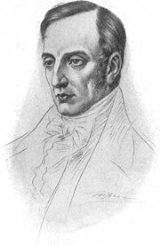
poet who, with Samuel Taylor Coleridge
, helped to launch the Romantic Age
in English literature
with the 1798 joint publication Lyrical Ballads
.
Wordsworth's magnum opus
is generally considered to be The Prelude
, a semiautobiographical poem of his early years which he revised and expanded a number of times. It was posthumously titled and published, prior to which it was generally known as the poem "to Coleridge".
And homeless near a thousand homes I stood,And near a thousand tables pined and wanted food.![]()
There's something in a flying horse,There's something in a huge balloon;But through the clouds I'll never floatUntil I have a little Boat,Shaped like the crescent-moon.![]()
A primrose by a river's brimA yellow primrose was to him,And it was nothing more.![]()
I traveled among unknown men,In lands beyond the sea;Nor, England! did I know till thenWhat love I bore to thee.![]()
Much converse do I find in thee,Historian of my infancy!Float near me; do not yet depart!Dead times revive in thee:Thou bring'st, gay creature as thou art!A solemn image to my heart. ![]()
Behold, within the leafy shade,Those bright blue eggs together laid!On me the chance-discovered sightGleamed like a vision of delight. ![]()
She gave me eyes, she gave me ears;And humble cares,and delicate fears;A heart, the fountain of sweet tears;And love, and thought, and joy.![]()
Sweet childish days, that were as longAs twenty days are now.![]()
Like an army defeatedThe snow hath retreated,And now doth fare illOn the top of the bare hill;The Ploughboy is whooping— anon— anon!There's joy in the mountains:There's life in the fountains;Small clouds are sailing,Blue sky prevailing;The rain is over and gone. ![]()

